Eggs vs Oatmeal – Which Is Better and Healthier?
Eggs and oatmeal are probably the two most popular breakfast options available. As a Certified Health Coach, many of my clients ask about which one is better. Can this question even be answered, which is better, eggs or oatmeal?
Eggs are better than oatmeal for weight loss, low-carb diets and sugar levels. According to the USDA, eggs contain 111% more protein, 7% fewer calories and 2,409% fewer carbohydrates when comparing 1 cup of cooked oatmeal to 2 large boiled eggs. Eggs have a lower glycemic index and provide more vitamins than oatmeal.
This article will include a side-by-side nutrient comparison between the two. I’ll examine which is better for certain goals like weight loss, bodybuilding and more. In addition, their glycemic index, satiety index and costs will all be covered.
In addition to coaching clients on both foods, I’ve purchased, researched and consumed both prior to, during and after writing this article. I personally consume both foods on a regular basis.
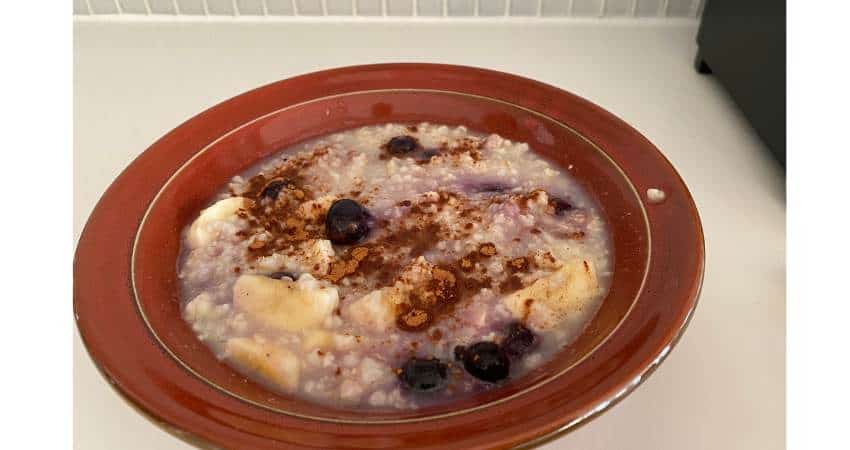
Eggs vs Oatmeal: Nutrition Comparison
Both foods have many of the same nutrients, but one has some the other doesn’t. The differences between the two can affect which one you choose or how you choose to eat them.
For this article I’m comparing one cup of cooked plain oatmeal without added ingredients to two hard boiled large eggs.
The following table is a side-by-side comparison of their nutrients.
| Oatmeal (1 cup)
Cooked |
2 Large Boiled Eggs | |
| Calories | 166 | 155 |
| Protein | 5.94 g | 12.6 g |
| Carbohydrates | 28.1 g | 1.12 g |
| Fiber | 3.98 g | 0 g |
| Fat | 3.56 g | 10.6 g |
| Cholesterol | 0 g | 373 mg |
| Sugar | 0.63 g | 1.12 g |
| Vitamin A | 0 IU | 520 IU |
| Beta-carotene | 0 mcg | 11 mcg |
| Vitamin C | 0 mg | 0 mg |
| Vitamin D | 0 mg | 87 IU |
| Vitamin B6 | 0.005 mg | 0.12 mg |
| Vitamin B9 (Folate) | 14 mcg | 44 mcg |
| Vitamin B1 (Thiamin) | 0.17 mg | 0.06 mg |
| Vitamin B2 (Riboflavin) | 0.03 mg | 0.51 mg |
| Vitamin B3 (Niacin) | 0.52 mg | 0.06 mg |
| Vitamin B5 (Pantothenic Acid) | 0.72 mg | 1.4 mg |
| Magnesium | 63 mg | 10 mg |
| Phosphorous | 180 mg | 172 mg |
| Potassium | 164 mg | 126 mg |
| Iron | 2.11 mg | 1.19 mg |
| Copper | 0.17 mg | 0.01 mg |
| Calcium | 21 mg | 50 mg |
| Zinc | 2.34 mg | 1.05 mg |
Egg vs Oats: Which is Healthier?
They both contain many of the same types of nutrients. This causes many people to ask, which is more healthier eggs or oatmeal?
Eggs are healthier than oatmeal due to fewer calories, carbohydrates and a higher percentage of protein and vitamins. Eggs provide more protein, vitamin A, vitamin D, B6, B5, folate, riboflavin and calcium.
Oatmeal is also healthy and provides a higher percentage of fiber, thiamin, niacin, magnesium, phosphorus, potassium, iron, copper and zinc than eggs.
I typically eat both eggs and oatmeal on different days to take advantage of each one’s nutrients.
Macros for Breakfast
The following is the amount of protein, carbs and calories for a typical breakfast egg and oats.
Protein
- 2 large boiled eggs contain 111% more protein than 1 cup of cooked oatmeal.
Calories
- 2 large boiled eggs contain 7% fewer calories than 1 cup of cooked oatmeal.
Carbohydrates
- 2 large boiled eggs contain 2,409% fewer carbohydrates than 1 cup of cooked oatmeal.
Eggs are a rich source of protein and have minimal carbs.
The following video explains which is better for blood sugar.
Which to Choose
It seems you can’t go wrong choosing one over the other. Both foods are healthy and a great source of nutrients. Some people will alternate between the two foods to avoid boredom. Others have combined them in the same breakfast.
Some people have different goals. Picking one or the other may depend on your particular goals.
Weight Gain
One such goal is to avoid weight gain, which is better for weight loss?
Eggs are better to lose weight due to having fewer calories and carbohydrates than oatmeal. Two boiled eggs have 7% fewer calories than one cup of cooked oatmeal.
They have a glycemic index of 0 compared to 55 for regular oatmeal. This means they take longer to digest and cause less spikes in blood sugar. This may make you feel fuller for longer.
In addition, some scientific studies have shown people feel fuller for longer after eating a breakfast consisting of eggs compared to oatmeal. Although oatmeal has a better satiety index score.
For more on glycemic index, satiety index and the studies mentioned, read more down further in this article.
Bodybuilding
If you’re in the gym lifting weights your goal may be to gain lean muscle mass. Which is better to build muscle?
Oatmeal is better for muscle gain than eggs due to its higher percentage carbohydrates and calories. The extra calories combined with the protein help to build and repair muscle. The extra carbohydrates help to provide energy while lifting weights.
I’ll always choose oatmeal on the mornings I go to the gym. I like the extra carbs which gives me more energy during my workouts.
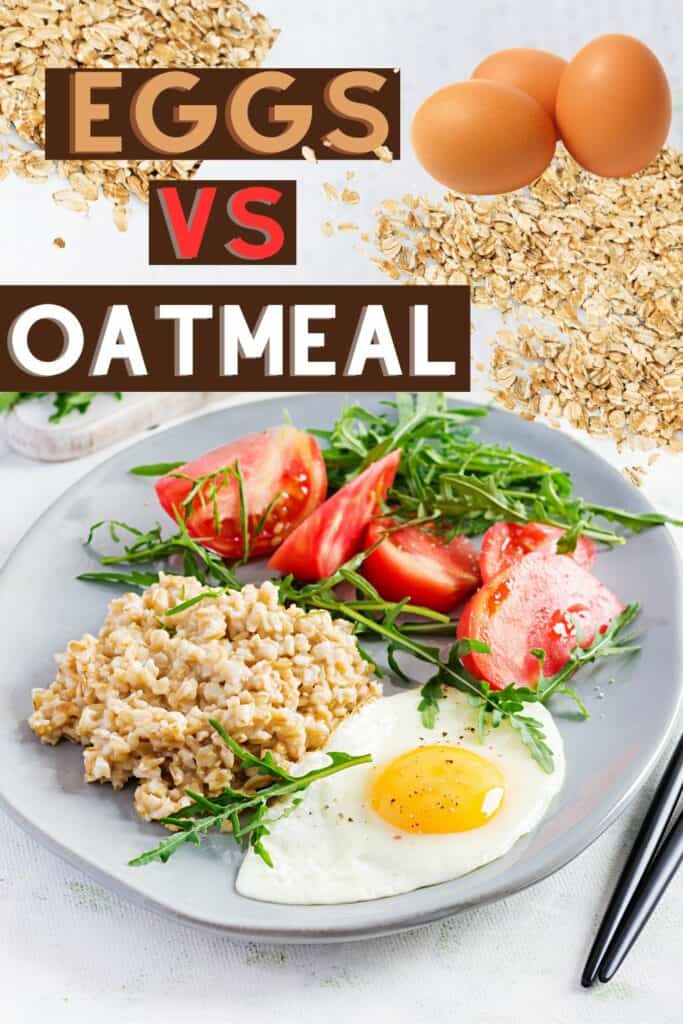
Low-carb Diet
If your goal is to consume a low-carb diet then carbohydrates are your number one concern. Which has more carbohydrates?
Oatmeal has more carbohydrates containing 28.1 grams per one cup of cooked oatmeal. Two hard boiled eggs contain 1.12 grams of carbohydrates making it better for a Keto or low-carb diet.
Gluten-Free
Oats are naturally gluten-free although some oats may come into contact with gluten products, or cross-contamination is possible with machinery or during storage. Always check the label of your food for the gluten free label.
Eggs are naturally gluten free although the way they are prepared at home or in restaurants put them at high risk for cross-contamination. The contamination may come from griddles, pans or utensils.
Recently it has been discussed many more people have at least a small amount of gluten intolerance and are unaware of it. Having less gluten in your diet is a good choice for most.
Important: Although oats are gluten free, they may come in contact with gluten-containing grains in storage or during transportation. Most of the Quaker products have solved this issue and label those products gluten free. Always check the label to determine if its gluten free.
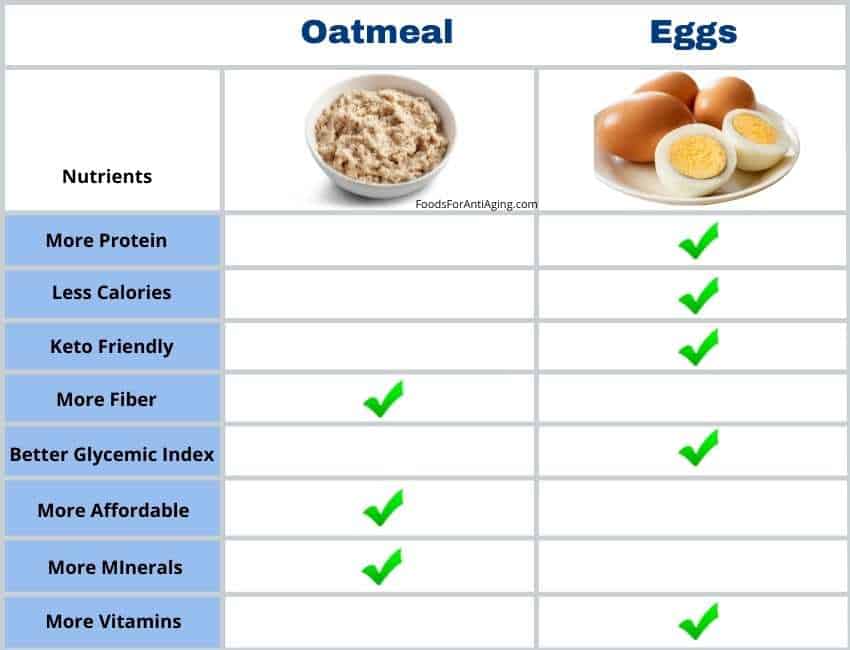
Glycemic Index
The glycemic index of food is important especially if blood sugar levels are a concern. Avoiding blood sugar spikes is an important part of consuming healthy food. This is true for diabetics or anyone worrying about their health.
The Glycemic Index (GI) is a scale measuring how fast a particular food raises the blood sugar in the blood3. Blood sugar spikes can lead to health complications with the heart, nerves, kidneys and eyes4.
Foods on the GI scale are categorized as:
- Low-GI foods: 55 or under
- Medium-GI foods: 56-69
- High-GI foods: 70 or over
How blood sugars levels are affected:
- Foods with a glycemic index 70 or more cause a quicker spike in blood sugar levels.
- Foods with a glycemic index 56 to 69 cause a moderate spike in blood sugar levels.
- Foods with a glycemic index 55 or less cause a slow spike in blood sugar levels.
Having more knowledge of the glycemic index of food and how it raises blood sugar, many people ask, which one has a higher glycemic index?
Eggs have a better glycemic index than oatmeal. Eggs fall into the low glycemic index with a GI of zero. Regular oats have a GI of 55. Steel-cut oats have a low GI under 55. Instant oatmeal has a higher glycemic index of 79.
Steel-cut has a lower GI because they are the least processed. Rolled oats are a little higher because they’ve been partially cooked. Quick oats have been steamed and rolled into thinner pieces to cook quicker. This process increases their glycemic index.
Although not typically a breakfast food, find out how brown rice compared in my article.
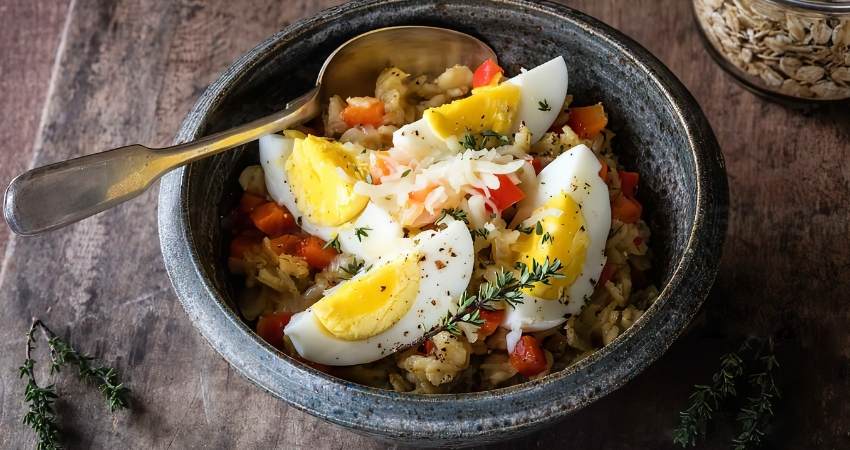
Satiety Index
Satiety is a term used to explain the feeling of being full and the loss of appetite which occurs after eating food. The satiety index is a scale showing how full a person feels after eating a certain food.
The satiety index was developed in 1995 from a study which tested 38 foods. The foods were ranked how they satisfied a person’s hunger. Foods scoring under 100 are considered less filling and foods scoring above 100 are considered more filling ((National Center for Biotechnology Information: A satiety index of common foods)).
The table below shows the satiety scores of breakfast foods.
| Breakfast Food w/milk | Satiety Index Score |
| Muesli | 100% |
| Sustain | 112% |
| Special K | 116% |
| Cornflakes | 118% |
| Eggs | 150% |
| All-Bran | 151% |
| Oatmeal w/milk | 209% |
Comparing the table above will help answer the question, does oatmeal keep you full longer than eggs?
Oatmeal will keep you full longer than eggs due to its higher satiety index of 209%. Eggs have a satiety score of 150%.
Of all the 38 total foods, oatmeal scored the fourth highest only beat by oranges, ling fish and boiled potatoes. Of the seven breakfast cereals with milk, it scored the best.
Of the 38 foods eggs scored the 14th best and the 3rd best of the breakfast foods.
High satiety food is likely to have a high satiety score for the following reasons:
- High in protein.
- High in fiber.
- High in volume (foods containing a lot of water or air).
- Low in energy density (foods low in calories for their weight)
Find out if grits has the better satiety in my article. Is it better for breakfast?
Does Oatmeal Really Have a Better Satiety Score?
I just finished saying it scored better than eggs in the 1995 study, so why am I asking this? I found another study in my research for this article saying otherwise.
Satiety Study
In a controlled study of 50 healthy individuals published in 20175, researchers studied the effects of egg vs. oatmeal breakfasts over 11 weeks. The study monitored both the cardiovascular disease biomarkers and the levels of ghrelin circulating in the blood.
Fasting plasma ghrelin is a hormone-releasing peptide secreted by the stomach when hungry. This promotes food consumption and weight maintenance.
The results showed those who had two eggs a day at breakfast showed no evidence of cardiovascular disease markers over their oatmeal eating group. In addition, they had greater satiety levels throughout the day.
Possible problem with the study.
The people were given flavored packets of oatmeal. Flavored packets are higher in sugar and probably should not have been used. Regular doesn’t contain added sugars which may be why this study contradicts the 1995 study I mentioned above.
I think the research suggests both are better at making you feel full than most other breakfast foods.
Find out how quinoa compared in my article. Is this newer food better?
The following video has some egg recipes to help you prepare them in healthy ways.
Health Benefits
Let’s examine how the nutrients benefit health. Eggs have a higher percentage of protein, B vitamins and calcium. Oatmeal was found to have a higher percentage of potassium, fiber, phosphorus, magnesium and iron.
Protein
Both foods are a good source of protein. Protein may help benefit the following:
- Reduce appetite
- Build and repair muscle
- Boost metabolism
- Weight loss
Potassium
Some medical experts recommend the potassium to sodium ratio of 4:1. Consuming too much sodium or not enough potassium throws off the delicate balance the kidneys need to remove the excess water6.
Potassium helps the body get rid of excess sodium reducing fluid build-up. These help keep systolic and diastolic blood pressure lower ((American Heart Association: How Potassium Can Help Control High Blood Pressure)).
According to Harvard Health, a number of studies have shown a connection between low potassium levels and high blood pressure7. The more potassium, the more sodium your body will lose.
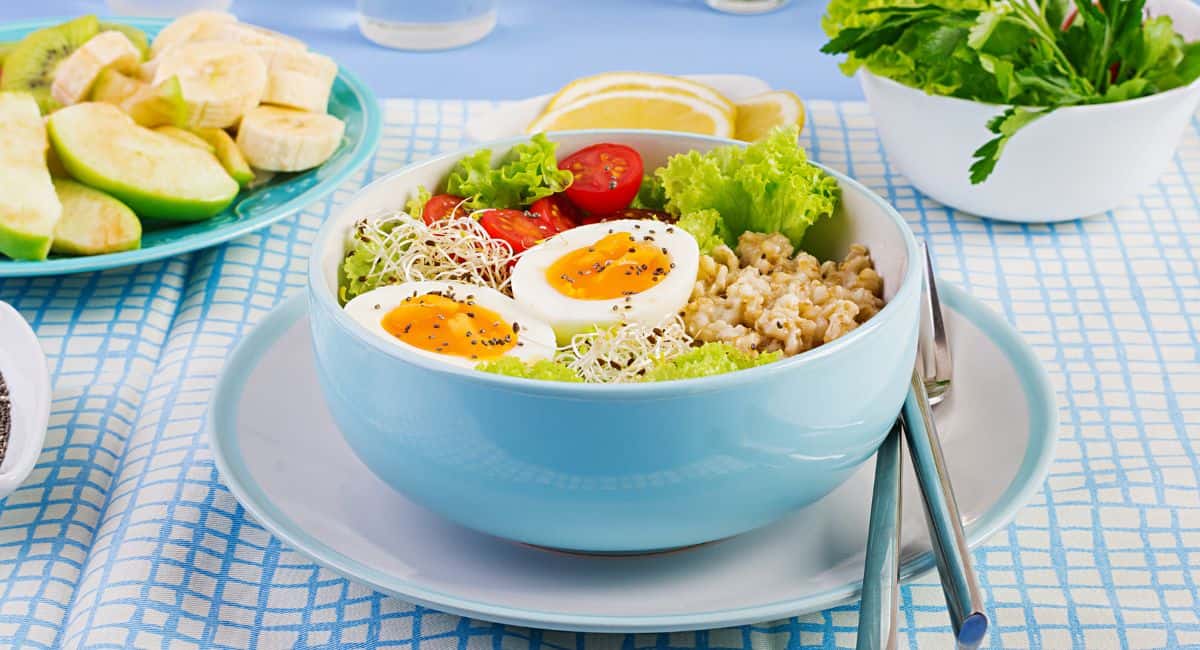
B Vitamins
The B vitamins provided include the following:
- B1 (thiamin)
- B2 (riboflavin)
- B3 (niacin)
- B5
- B6
- B9 (folate)
B vitamins help support the following:
- Brain function.
- Red blood cells.
- Digestion.
- Nerve function.
- Cardiovascular disease.
- Energy levels.
A lack of B vitamins has been associated with oxidative stress and neural inflammation. In a study released in 2018 32 healthy adults were given B vitamin supplementation for six months. The results indicated preliminary evidence B vitamin supplementation reduced oxidative stress and inflammation8.
Find out if granola had more nutrients in my article.
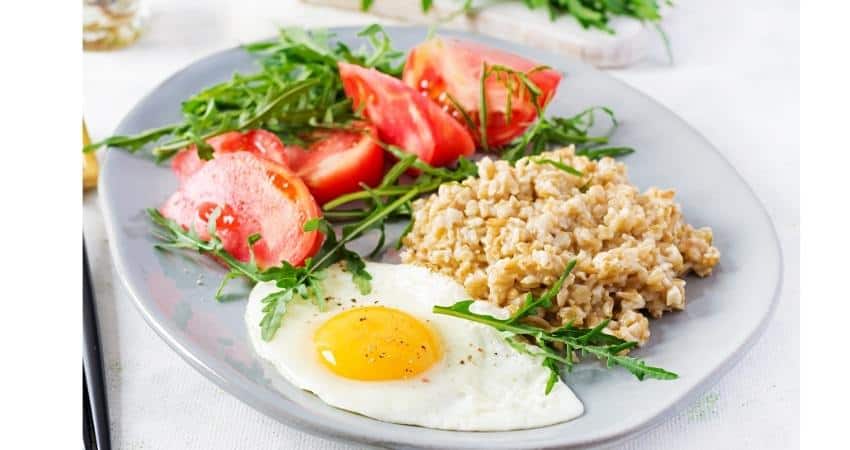
Dietary Fiber
Foods high in soluble fiber are helpful for many reasons ((National Center for Biotechnology Information: Mechanisms linking dietary fiber, gut microbiota and colon cancer prevention)). What makes fiber soluble is it dissolves in water.
Dietary fiber is known for the following:
- Manage the blood glucose levels which helps decrease the risk of diabetes.
- Helps avoid constipation and have a more regular stool.
- Help overall digestive health.
- Aids greatly in weight management because it allows you to feel full faster and eat less.
Phosphorus
Phosphorus has been shown in scientific studies to help with the following:
- Promote bone and teeth strength.
- Help the body store and manage energy.
- Promote healthy nerve conduction.
- Muscle contraction.
- Muscle recovery.
- Help the kidneys remove waste.
Magnesium
Magnesium helps keep blood pressure levels stable and balanced. Recent scientific research examined previous studies and concluded magnesium supplementation decreased systolic and diastolic blood pressure9.
Magnesium helps control the following:
- Muscle
- Blood pressure
- Blood sugar
- Nerve function
- Insomnia
In the heart and muscles, magnesium competes with calcium to help the muscles relax after contracting. When the body is low in magnesium, calcium can over stimulate the heart muscle’s cells causing a rapid or irregular heartbeat.
Check out the pros and cons of overnight oats compared to regular in my article.
Calcium
Calcium is important for the heart and blood pressure. Harvard Health reports calcium helps maintain blood pressure by helping in the controlling of the relaxing and tightening of blood vessels10.
Calcium also helps the following:
- Help the muscles to function properly.
- Helps nerve function.
- Build and maintain strong bones.
Iron
Much higher in iron than other grains, oatmeal is an excellent choice if you need getting your daily value of iron. Iron is essential in the creation of red blood cells and is a necessary part of any healthy diet.
Iron is also vital for growth and development, as some hormones need iron to be appropriately balanced11.
Find out the nutrient difference between instant and regular.
Saturated Fat and Eggs
Saturated fat used to be a huge concern when it came to eating eggs and dietary cholesterol. This why many people switched over to egg whites.
This and meal plans have changed over time. More recent news and studies have shown consuming two for breakfast every day does not adversely affect the biomarkers associated with cardiovascular risk.
Two large boiled only contain 3.27 grams of saturated fat.
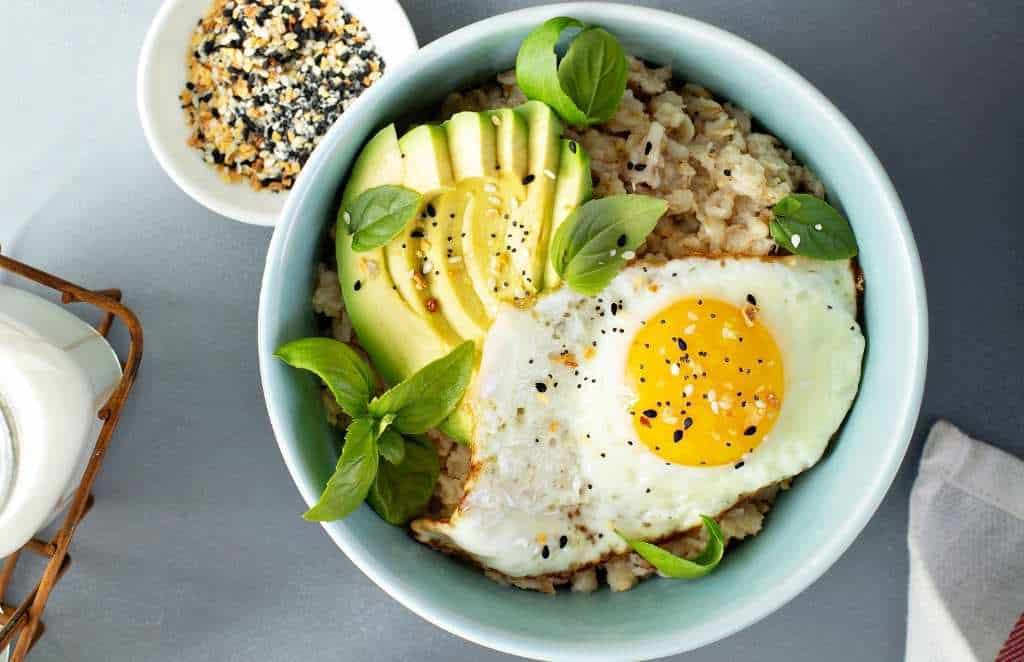
The Prices
It seems every time I pay at the supermarket the price is higher than the last time. In addition, it seems I have less groceries in my shopping cart.
If you would like to spend less money at the supermarket, then the cost of food certainly matters. The price may sway your decision about which one to use in your meals more often. Therefore, which costs more?
Eggs costs more than oatmeal per serving. The average price for oatmeal is $0.18 per 40 gram serving. The average price for a 2 egg serving is $0.51. Eggs cost 180% more per serving.
To conduct some original research, I decided to search various different stores to compare the price of both. The ones chosen were store brand and not organic, just regular white and large.
I first visited the Shoprite supermarket for the prices of both:
- Wholesome Pantry Organic old-fashioned regular
- $2.49 per 18 oz container (13 servings) equaling $0.19 per 40 g serving
- 12 Large Eggs (Bowl & Basket)
- $3.49 per dozen (6 servings) equaling $0.58 per 2 egg serving
I then checked Walmart for the prices of both:
- Quaker Old Fashioned Oats
- $4.98 per 42 oz container (30 servings) equaling $0.17 per 40 g serving
- 12 Large Eggs (Great Value)
- $2.69 per dozen (6 servings) equaling $0.45 per 2 egg serving
If you have any questions about this article don’t hesitate to email us. You can find an email on our contact page.
Read Next – More Oatmeal vs Food Articles!
Muesli vs Oatmeal – What’s The Difference? Let’s Compare
Steel Cut Oatmeal vs Oatmeal: Which Is Better? Let’s Compare
Oatmeal vs Rice: Which Is More Healthy? (We Find Out)
- USDA: Cereals, oats, regular and quick, unenriched, cooked with water, without salt [↩]
- USDA: Egg, whole, cooked, hard-boiled [↩]
- Harvard Health Publishing: Glycemic index for 60+ foods [↩]
- National Institute of Diabetes and Digestive and Kidney Diseases: Know Your Blood Sugar Numbers: Use Them to Manage Your Diabetes [↩]
- National Center for Biotechnology Information: Consuming Two Eggs per Day, as Compared to an Oatmeal Breakfast, Decreases Plasma Ghrelin while Maintaining the LDL/HDL Ratio [↩]
- National Center for Biotechnology Information: The Effect of the Sodium to Potassium Ratio on Hypertension Prevalence: A Propensity Score Matching Approach [↩]
- Harvard Health: Potassium lowers blood pressure [↩]
- National Center for Biotechnology Information: The Effect of a High-Dose Vitamin B Multivitamin Supplement on the Relationship between Brain Metabolism and Blood Biomarkers of Oxidative Stress: A Randomized Control Trial [↩]
- National Center for Biotechnology Information: Effect of magnesium supplementation on blood pressure: a meta-analysis [↩]
- Harvard Health: Key minerals to help control blood pressure [↩]
- National Institutes of Health: Iron [↩]

What oatmeal do you eat that is only 166 calories for an entire cup??? Isn’t it double that for one cup?
Hi John. That’s cooked oatmeal. As per the USDA, 166 calories per cup for cooked in water regular and quick oats.